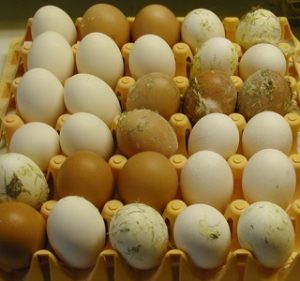On Sept. 23, 2015, Brisbane’s South Bank Surf Club allegedly made up a large batch of raw-egg-based aioli sauce and served it for seven days.
 At least 28 diners were sickened.
At least 28 diners were sickened.
At the time, the manager of the club said the cause was “a bad batch of eggs’’ provided by a supplier. They said the eggs had been used in sauces served with seafood platters.
“We’ve been caught out, unfortunately. Our customers’ wellbeing is our priority and anyone with concerns can get in touch with us,” they said. “To rectify the problem, we are not making sauces in-house.’’
This is a common refrain in Australia.
We, the chefs, would never put the health of our customers in harm’s way, yet they continue to do so with the line, we got a bad batch of eggs.
 Now, Brisbane City Council health inspectors have filed a complaint in Brisbane Magistrates Court accusing the club, owned by Brisbane hospitality king Bevan Bickle, of letting the aioli and other sauces sit kitchen benches for up to three hours without refrigeration on the day they were used in meals including fish and chips, burgers and pulled pork sandwiches between September 23 and October 1 last year.
Now, Brisbane City Council health inspectors have filed a complaint in Brisbane Magistrates Court accusing the club, owned by Brisbane hospitality king Bevan Bickle, of letting the aioli and other sauces sit kitchen benches for up to three hours without refrigeration on the day they were used in meals including fish and chips, burgers and pulled pork sandwiches between September 23 and October 1 last year.
Court documents state aioli is a “potentially hazardous food” because “pathogenic microorganisms” can grow due to the raw egg and it needs to be refrigerated.
The club faces 32 charges of breaching food safety laws.
When inspector Heath Vogler visited the restaurant on October 16 he alleges the aioli was kept at 11C.
The council summons filed in court states aioli must be stored below 5C to minimise the growth of poisonous bacteria.
The case returns to court on December 23. The restaurant has not entered a plea.
A table of Australian egg outbreaks is available at https://barfblog.com/wp-content/uploads/2015/10/raw-egg-related-outbreaks-australia-10-9-15.xlsx












